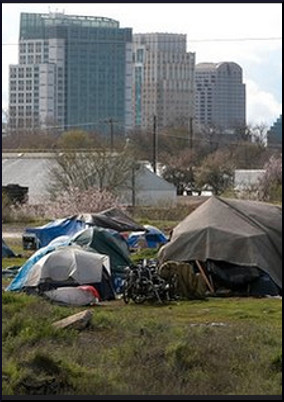
Two years ago, the print publication High Country News published a long and detailed story by Scott Bransford, concentrating on tent cities in three American cities. Fresno, California, was rated by the Brookings Institution (a public policy institute, or think tank) in 2005 as the poorest American city. At the time when this piece was written, Fresno was estimated to contain about 2,000 people experiencing homelessness, of whom about 40% were said to have been incarcerated at some point.
Seeing a statistic like that, don’t you wonder how many of those incarcerations were a direct result of homelessness? Society and its laws have created a diabolical revolving door. What a futile exercise of power it is, to throw people in jail for vagrancy and then point the finger and say, “Look how many of those homeless people have criminal records!”
In his classic article, Bransford interviewed some of the 200-or-so people camping on Union Pacific Railroad land in the midst of Fresno, in a “squatter village” known as Taco Flat or Little Tijuana. He wrote,
Just to the south, under a freeway overpass, there’s another camp of roughly equal size called New Jack City where most of the residents are black. Even more makeshift dwellings are scattered throughout the neighborhood nearby.
The reporter named “tough-love social policies” and heedless real estate speculation as the main factors that have knocked people out of their jobs and homes. Humans don’t always make the best choices, and even if they are paragons of individual and social behavior, they can still be brought low by illness, disability, flood, fire, misguided financial investments, and a thousand other misfortunes.
Bransford suggests that the United States take a look at the rest of the world, where he contends that the “predominant mode of city-making” is from the ground up, with cities that develop out of slums. He says,
Informal urbanism, characterized by unauthorized occupation of land, makeshift construction, and lack of public utilities, is how many burgeoning nations meet their housing needs. It thrives in places like Fresno, where poverty is endemic and there is a wide gap between rich and poor.
As in Sacramento and Portland, the dispossessed people of Fresno won a lawsuit a few years back. They filed suit against their city and state, for destroying their property in a series of “sweeps.” The city and state were told to pay $2.3 million for damages. Yes, that is a good thing. It’s wonderful that the people experiencing homelessness also experienced some justice for a change.
But think how much good that money might have done if it had been used earlier, and in a different way. If that green energy had been spent some other way, maybe those particular people would not have been camping out, being vulnerable to having everything taken from them by the police. Maybe they would have had jobs and/or places to live.
Money is green energy, so this is reminiscent of words written in another context, but with a parallel meaning, by Richard R. Troxell:
Clearly, homelessness has taken root in America. It is very sad when we spend such energy to deal with the evils of homelessness instead of creating pathways to end it.
Nowadays, Fresno is one of the hot spots extensively covered by New America Media, or NAM, an organization with connections to more than 3,000 ethnic media. The young, a similarly “invisible community,” are NAM’s other important constituency. Prime example: Rebecca Plevin’s “Young and Homeless.”
We recently talked about Ontario, California, in relation to the irrational stupidity of police “sweeps.” But there is plenty more to say about Portland, Oregon. That will be coming up next.
Reactions?
Source: “Camping for their lives,” Utne.com, 2009
Image by Peta-de-Aztlan, used under its Creative Commons license.


